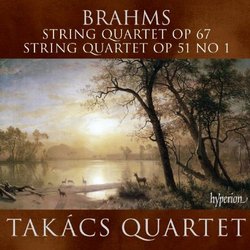Brahms's String Quartets The Way They Should Be Played
John A. Moskal II | Carmel, IN USA | 03/19/2009
(5 out of 5 stars)
"The Takacs Quartet has become, in my eyes and the eyes of every violinist, violist, or cellist that I've talked to in the last two years, the number one String Quartet group of whom to listen. I am no novice to the genre, but in the last two years I've picked up every album of theirs I've been able to get my hands on, never once being even slightly disappointed, and this one meets, if not surpasses, all my previous purchases.
Their technicality is beyond question. Their instruments are mere extensions of their arms and they are in perfect harmony with them. Add to that a unity of sound concept; every member understands together the idea of the quartet music and the direction in which it is going. They ARE the group, not four individuals playing music together, but one quartet producing the most gorgeous chamber music you've ever heard. This group plays with as tight and unified of a sound as I have yet to witness.
Last (but certainly NOT least), we have their interpretation. They've waited on recording Brahms until they were sure they could do it justice. From a composer who burned (it is reported) over ten string quartets before allowing one to be performed, the Takacs Quartet here has approached their performances in the same way; as if Brahms himself were painstakingly overseeing their rehearsal of each movement.
The quartet takes every ounce that they learned from their Beethoven cycle (also highly recommended) and applied it here. Dubbed by Schumann as the greatest composer of his day and successor to Beethoven, Brahms's music was more influenced by the work of previous composers than any before him; the classical influence can be seen in his structure just as easily as the romantic chord usage and cadence avoidance and augmentation. The Takacs Quartet applies every bit of that to their performance. From the opening of the Op. 67, reminiscent of a Schubertian melody placed in a Beethovenian string quartet, to the close of the Op. 51, as emotionally driving as any good romantic idea of yearning, they never let up for a second; the tiniest of passages become musical brilliance.
Despite every ounce of painstaking work that quite obviously went into this recording, never once does it sound stale or boring. The music moves constantly from one note to the next always searching, always moving forward and through. While they know where every note needs to be placed according to the score, it doesn't sound like that's the only reason it's there. Every note sounds like that's where it belongs so that the music sustains the greatest beauty and impact.
In short, if you've ever even thought for half a second that you'd like to listen to Brahms, a string quartet, romantic music, or for that matter any music at all, you should get this CD. The price is very reasonable for a performance of this caliber, indeed I would gladly pay as much again. No music enthusiast of any kind should be without this CD."
Elevates my (already high) opinion of Brahms
Russell I. Burnett | Newark, DE, USA | 05/23/2009
(5 out of 5 stars)
"I've heard a few other versions of Brahms' three string quartets (Tokyo, Emerson, Alban Berg), and all left me thinking that Brahms' best work (which, in my opinion, is some of the best ever written) was not in this genre. The Takacs Quartet have changed that opinion dramatically.
Their previous release (Quintet Op. 34 + Quartet Op. 51 No. 2) left me anxious to hear this one, and they have not disappointed in the least. The first time through both quartets here (Op. 67 + Op. 51 No. 1) I found multiple passages that I had either not noticed before or not really appreciated. That experience has repeated itself as I've given them additional listenings. I cannot imagine a more perfect performance of these quartets.
This ranks right up there with the finest Takacs Quartet recordings."

